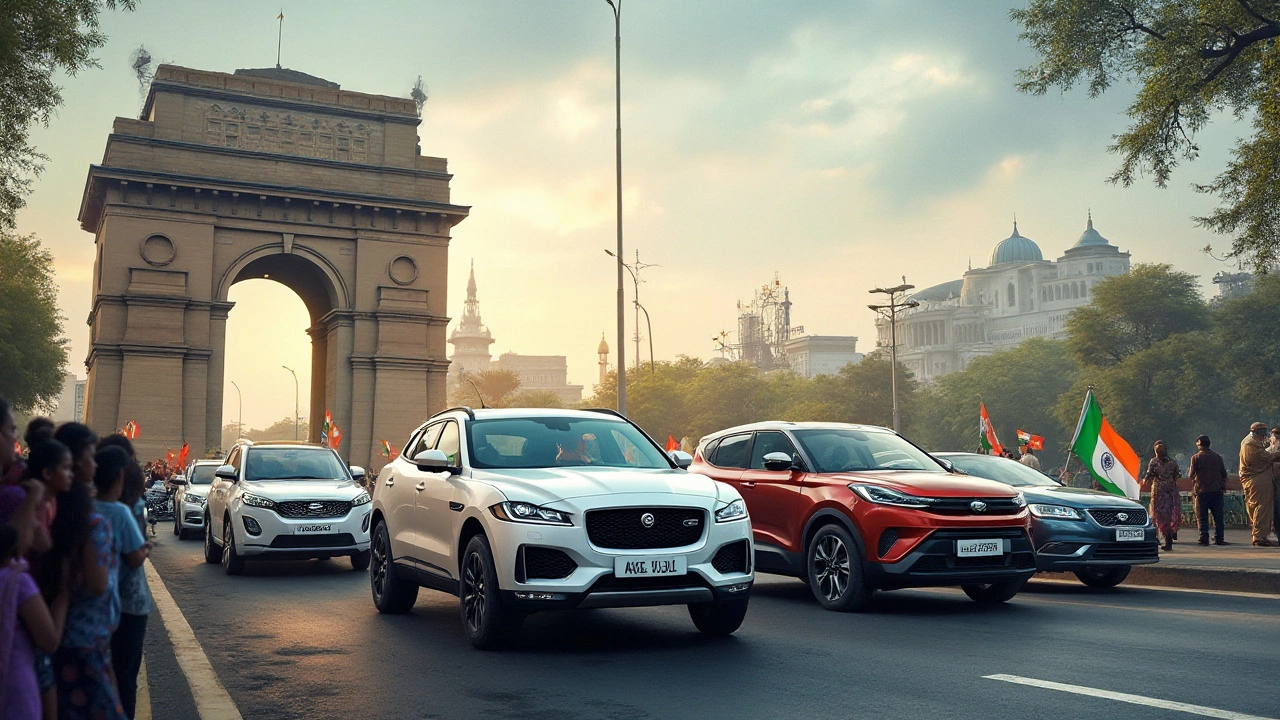In recent years, India has emerged as a major player in the global automobile industry. With a keen eye on expansion, several Indian companies have strategically acquired renowned international car brands. These bold moves have not only reshaped the global car market but have also brought new experiences and choices to consumers around the world.
One such success story is Tata Motors, which made headlines with its acquisition of Jaguar Land Rover. This iconic pairing marked a significant milestone, proving that Indian engineering and management could successfully revitalize and nurture premium luxury brands.
Meanwhile, Mahindra & Mahindra has also made its mark, with acquisitions that offer fresh perspectives and innovative engineering to global markets. Known for its expertise in utility vehicles, Mahindra’s ventures have expanded its portfolio and influence beyond Indian borders.
These acquisitions demonstrate how India's automobile companies are steering towards a future that combines rich heritage with cutting-edge technology, showcasing an industrial capability that blends tradition with modernity. The story of India's growing automotive influence is one of strategy, ambition, and a relentless drive to shape the future of mobility.
- Global Expansion of Indian Car Brands
- Tata Motors: A Leader in Acquisitions
- Mahindra & Mahindra's Global Ventures
- Tech-Driven Innovation and Design
- Impact on Global Automobile Markets
- Future Prospects of Indian Car Companies
Global Expansion of Indian Car Brands
The journey of Indian car brands into the global market is a testament to the country's ambition and strategic foresight. Over the past decade, companies like Tata Motors and Mahindra & Mahindra have transformed their local success into international recognition. This expansion is not merely about acquisition; it's the story of how cultural synergies and innovative strategies have fueled mutual growth. From redefining the manufacturing processes to adopting newer technologies, these brands have carved a niche in a highly competitive market. Much of their success can be attributed to their ability to respect existing brand legacies while infusing elements of Indian ingenuity and work culture. This strategic approach has bolstered their international appeal, and what seemed audacious at the beginning has now become an inspiring case study in global business circles.
Strategic Acquisitions
One of the most notable moves was when Tata Motors acquired Jaguar Land Rover (JLR) in 2008. This acquisition was met with skepticism initially, as many doubted if an Indian conglomerate could manage such esteemed brands. Today, JLR has thrived under Tata's ownership, introducing models that are celebrated globally for their luxury and innovation. This success has painted Tata Motors not only as a savvy investor but also as a responsible guardian of legacy brands that are integral to automotive history. Similarly, Mahindra & Mahindra's acquisition of SsangYong Motor Company in 2010 highlighted its intention to diversify and strengthen its presence in the SUV segment worldwide. By integrating new technologies and expanding R&D, Mahindra helped enhance SsangYong's profile internationally.Innovating Through Collaborations
Collaboration has been a key component of Indian brands' global strategy. By forming partnerships with like-minded firms across the world, these companies have embraced cross-cultural innovation. Mahindra, for instance, partnered with Ford to co-develop vehicles, leveraging each other's strengths in markets they previously found challenging. This collaboration exemplifies how joint ventures can thrive by utilizing combined expertise to create value-driven products."The strength of Indian automotive manufacturers lies in their ability to adapt and overcome challenges by learning from partners and leveraging their capabilities," remarked a leading automotive analyst in a recent study.Such partnerships are pivotal, as they offer a platform to share the risks and rewards of a dynamic industry landscape.
The ambition of Indian companies extends beyond just owning international brands. They are continually investing in research and development to innovate future technologies. Tata Motors, for example, has been extensively investing in electric vehicles (EVs), with an aim to lead the EV market in India and provide sustainable solutions globally. Similarly, adhering to sustainable practices and environmentally-friendly manufacturing processes are being prioritized. These forward-thinking strategies are not just about keeping pace with global trends; they're about setting benchmarks that align with the evolving expectations of a tech-savvy consumer base around the world.
Impact on Global Automobile Markets
With their steady expansion, Indian car brands have influenced global automobile markets significantly. They have introduced a new dimension of affordability and yet maintained quality, which is especially vital in emerging markets. As a result, the Indian automotive industry is now perceived as a formidable contender, combining cost-effective engineering with innovation. A crucial aspect of this perception shift is the evident commitment to quality, showcased through stringent quality checks and consumer-oriented designs.As these brands grow, they also contribute to local economies where their international bases are set. By employing local talent and resources, Indian car brands promote cross-border exchange of knowledge and skills. Such expansion strategies have not only increased their global footprint but have also reinforced India's status as a meteorically rising automotive manufacturing hub on the global map. The narrative of India's global expansion in the car industry is one of bold moves, meaningful partnerships, and a continuous quest for excellence. This ambition is not just reshaping the industry but also creating a space where Indian ingenuity meets global expertise, crafting a future full of possibilities.
Tata Motors: A Leader in Acquisitions
Tata Motors has established itself as a formidable force in the global automotive landscape, primarily due to its strategic acquisitions. Established in 1945, this Indian car giant has evolved from a local manufacturer to a key player with a diverse portfolio, acquiring some of the world's most distinguished automobile brands. The significant turning point in Tata Motors' history was undoubtedly its acquisition of the iconic British brands, Jaguar and Land Rover, in 2008 from Ford Motor Company. This $2.3 billion deal was instrumental in reshaping Tata Motors' image, demonstrating that Indian car companies could successfully manage and innovate prestigious international brands.
The purchase of Jaguar Land Rover (JLR) wasn’t just a business transaction; it was a bold statement of intent. This acquisition repositioned Tata Motors in the global pecking order and showcased India's capability to nurture luxury automotive brands. By investing heavily in rejuvenating the JLR brand, Tata capitalized on its engineering expertise while also preserving the heritage and luxury identity of these brands. This strategic maneuver allowed Tata Motors to double JLR's sales by 2015, significantly boosting its revenue stream. An astounding 60% of Tata's revenue is now drawn from international sales, with JLR as the crown jewel.
In an insightful comment, Tata Motors' former chairman Ratan Tata once remarked,
"We have a great partnership with Jaguar Land Rover. We see that these brands will have a global reach and we are committed to their future in growth markets."His emphasis on partnership and growth underscores the vision that guided Tata Motors in this acquisition. Today, Tata's investment in electric vehicles (EVs) through JLR exemplifies its forward-thinking approach, aligning luxury with sustainability. The development of the electric Jaguar I-Pace is a testament to how Indian ownership has spurred technological innovation within these brands.
Beyond just acquiring brands, Tata Motors has expanded its footprint in the commercial vehicle segment by partnering with Fiat, enabling a greater market share in India and overseas. Its dedication to research and development, underscored by the establishment of advanced design studios and R&D centers globally, highlights a commitment to continuous innovation. Such centers are crucial in ensuring that Tata Motors remains competitive, adapting to ever-changing market dynamics. By harmonizing global expertise with local insights, Tata Motors has turned acquisitions into opportunities, enhancing Indian car industry prestige on the global stage.
Tata Motors' journey into international markets is a blend of ambition and strategic foresight. The company's acquisition strategy clearly highlights an understanding of cultural integration, product transformation, and leadership in sustainability. For enthusiasts and investors alike, Tata Motors represents a tale of how Indian car brands have grown from modest beginnings to major players on the world's automotive stage, reflecting a widening influence of Indian innovation and business acumen.

Mahindra & Mahindra's Global Ventures
When you talk about Indian car brands on a global scale, Mahindra & Mahindra stands as a name synonymous with robust engineering and innovation. Established in 1945, this behemoth initially engaged in steel trading before venturing into automotive manufacturing. Today, their footprint is imprinted not just in India but across continents. One might recall their acquisition of Korean carmaker SsangYong in 2010. This move was more than just a business transaction; it represented a leap towards a higher echelon of automotive production. The acquisition made headlines as it was aimed at complementing Mahindra's utility vehicle expertise with SsangYong's all-wheel-drive technology.
Significantly, Mahindra's global ventures extend beyond acquiring SsangYong. With an eye on the American market, they've ventured into the off-road vehicle niche through their subsidiary, Mahindra Automotive North America (MANA). The establishment of a $230 million facility in Detroit highlights their commitment to penetrating the Western markets. Here, Mahindra produces the Roxor, an off-road vehicle that harkens back to their legacy of utility excellence and is tailor-made for the rugged terrain, embodying Mahindra’s slogan of 'Rise'.
Their strategic moves aren't just about acquisitions. Mahindra's collaboration with Ford to co-develop mid-size SUVs was particularly noteworthy. In a rapidly evolving automotive landscape, such partnerships allow Mahindra to leverage Ford's manufacturing prowess alongside its own market acumen in India. It's a strategy that aligns with the growing demand for SUVs globally, showcasing Mahindra’s adaptability in manufacturing practices and consumer preferences.
Mahindra’s reach is expansive, with a presence in Latin America, Africa, and Southeast Asia. They focus on local relevance to ensure that their vehicles cater to specific regional needs. For instance, in the Philippines, their Scorpio SUV is tailored to handle the tropical climate and rugged geography, while in South Africa, Mahindra models are cherished for their durability. The regional adaptability is a testament to Mahindra’s understanding of diverse market intricacies and their commitment to delivering quality vehicles that resonate with local demands.
In the context of sustainability, Mahindra’s dedication is evident through their introduction of electric vehicles in their lineup. They are part of a growing wave of manufacturers pushing toward eco-friendly alternatives. Their electric car models, like the eVerito and the Treo electric rickshaw, are part of an ambitious plan to revolutionize green transportation, especially in the urban centers of India.
Perhaps one of the most intriguing aspects of Mahindra’s global ventures is their commitment to 'Mahindra Rise', a philosophy that stresses driving positive change through performance excellence and accepting no limits. This journey is vividly reflected in the words of Anand Mahindra, the Chairman of Mahindra Group, who once said:
'The Mahindra philosophy has always been about seizing opportunities while maintaining our values, and this has been the guiding principle behind our global expansions.'Such ethos not only propels Mahindra forward but also underscores the longstanding Indian tradition of combining ethical business practices with innovation.
Tech-Driven Innovation and Design
In the car manufacturing world, what sets apart true leaders is their commitment to innovation and design. India has showcased this prowess impressively, with companies like Tata Motors and Mahindra & Mahindra spearheading this progression in the Indian automotive industry. As technology accelerates, these firms have seamlessly adapted to the demands and preferences of the modern consumer by integrating cutting-edge technology into their designs. From fully electric vehicles to advanced safety features, these brands are driving substantial change in how cars are perceived and built.
Tata Motors, for instance, has made significant strides by incorporating artificial intelligence and machine learning into their vehicle systems. These technologies facilitate enhanced features such as predictive maintenance alerts and advanced driver assistance systems (ADAS). This commitment to tech innovation was underscored by their recent unveiling of a concept electric vehicle equipped with autonomous driving capabilities. Such features not only appeal to tech-savvy customers but also position Tata as an innovator in the space of electric mobility.
Similarly, Mahindra & Mahindra has made waves with their sustainable automotive technologies. Their focus on strengthening electric vehicle (EV) infrastructure speaks to a larger vision of promoting cleaner mobility options. Mahindra's work in this arena includes creating an extensive network of EV charging stations across major Indian cities. With rising environmental concerns, initiatives like these highlight the brand's effort to support global sustainability while catering to a growing segment of environmentally-conscious consumers. In a recent interview, Anand Mahindra stated,
"Innovation is the heart of sustainable progress, and we are committed to making transportation both smart and green."
Beyond environmental considerations, design tweaks in aerodynamics and interior ergonomics have also stood out in Indian car companies' recent models. By investing heavily in R&D, these companies are ensuring that their vehicles not only perform efficiently but also provide maximum comfort and user-friendly interfaces. Seamless integration of infotainment systems, eco-friendly materials for interiors, and space optimization are just some aspects where substantial changes are being made to meet global standards.
Statistics indicate that India's auto sector is seeing a technology investment growth rate of around 30% annually, reflecting the aggressive push toward integrating tech innovations. The Indian car brands' efforts in combining tech innovation with practical design have proven successful, as suggested by the surging demand for models like the Tata Nexon EV in both domestic and international markets. This dynamic approach to car manufacturing has not only elevated the status of Indian-owned car brands globally but has also set a benchmark for sustainable innovation in the industry.

Impact on Global Automobile Markets
When Indian car companies such as Tata Motors and Mahindra & Mahindra made big moves on the global stage, the automotive landscape began to change in intriguing ways. These companies, spearheading Indian car brands, not only expanded their footprints but also influenced market dynamics with their distinctive strategies. For instance, the purchase of internationally acclaimed brands introduced new energy into the companies, allowing them to harness advanced technologies and design philosophies that were previously beyond their reach. This enabled the Indian brands to compete in segments traditionally dominated by well-established international giants.
The acquisition of Jaguar Land Rover by Tata Motors is a prime example. This bold undertaking did not merely involve financial transactions; it established a cultural and engineering symbiosis that enriched both entities. It was a turn of events that brought fresh design thinking and market strategies to Tata Motors, elevating India's stature as a credible player capable of engineering luxury and performance with global appeal. Today, Jaguar Land Rover thrives under Tata's stewardship, which symbolizes an unprecedented merging of Western automotive legacy with Indian technological resilience.
Mahindra & Mahindra's strategic investments, such as acquiring SsangYong Motor, played a similar role. By integrating South Korean flair for innovation with Indian operational proficiency, Mahindra has not only expanded its production capabilities but also diversified its offerings. This acquisition helped Mahindra enhance its technological prowess and brand appeal, positively impacting its position in critical international markets. It's evident these strategic acquisitions support Mahindra's vision to become a significant name in the global automobile market.
Interestingly enough, with the experience of these strategic purchases, Indian companies are now pioneers in electrification and sustainability. They are profoundly reshaping their portfolios to reflect environmental consciousness, a trend that resonates with global consumers increasingly concerned with sustainability. This shift is crucial as countries ramp up their goals for zero emissions and sustainable energy transitions. Indian brands, now imbued with advanced automotive know-how, are well-equipped to ride this revolutionary wave.
From a market perspective, the success stories have spurred increased investor confidence in the Indian automotive industry. As global markets become more open and interconnected, Indian corporations leverage these international holdings to introduce innovative models and enhance their domestic offerings. This trend suggests that we're witnessing the unfolding of a new era where Indian companies are no longer outliers trying to catch up with global competitors. Instead, they are equals working side by side with them, shaping future mobility solutions and setting automotive trends.
| Brand | Indian Parent Company | Acquisition Year |
|---|---|---|
| Jaguar Land Rover | Tata Motors | 2008 |
| SsangYong Motor | Mahindra & Mahindra | 2011 |
"The strategic acquisition of Jaguar Land Rover reflects Tata Motors' ambition to be recognized as a leading global player," John Zeng, Managing Director of Global Automotive Industry Research.
With digitization and technological advancements marking the future of mobility, India's current influence in the automobile space seems undoubtedly beneficial for global markets. As automotive industries worldwide embrace electrification, automation, and connectivity, Indian companies' early investments place them in a favorable position to drive change, set new benchmarks, and perhaps lead in crafting the next generation of vehicles.
Future Prospects of Indian Car Companies
As we look into the future of Indian car brands, the prospects are bright and full of potential for growth and innovation. In the coming years, Indian car companies are poised to become even more influential on the global stage, driven by advancements in technology and a deep understanding of diverse market needs. One major factor propelling Indian companies to the forefront is their commitment to sustainable development. With the global shift towards electric vehicles (EVs), Indian brands are already making strategic investments in EV technology. Tata Motors, for instance, has taken bold steps with its Nexon EV, contributing significantly to the EV market in India.
Moreover, Indian car manufacturers are known for their resilience and ability to adapt to changing trends. By leveraging their cost-effective manufacturing hubs, they have the opportunity to provide quality vehicles at competitive prices, a factor that is crucial in penetrating emerging markets. Mahindra & Mahindra, with its expertise in sports utility vehicles, is also exploring hybrid and electric options, positioning itself as a leader in sustainable transport solutions. These efforts are supported by government policies advocating for a greater share of electric vehicles on the roads, aiming for ambitious goals by mid-decade.
"The future of mobility is electric" says Anand Mahindra, Chairman of the Mahindra Group, emphasizing the company’s commitment towards creating a robust ecosystem for EVs.
In addition to technological innovation, Indian car brands are looking to digitize the customer experience. By incorporating AI and machine learning into the development process, they aim to create more personalized and efficient services for their customers. This digitization is seen not only in sales but also in after-sales services, making it easier for customers to maintain their vehicles and access help when needed. Indian automotive industry is also keen on collaboration. Partnerships with tech firms and global carmakers are becoming more common as they aim to bring enhanced features and connectivity to their vehicles. Such collaborations hold the promise of enhanced safety, navigation systems, and overall driving experience.
The strategic foresight, coupled with an agile approach to market changes, places Indian car companies in a favorable position to make a significant impact globally. As they continue to innovate and expand, it is expected that their contribution to global automobile markets will expand considerably. The integration of new technologies, commitment to sustainability, and enhancement of customer experience are pivotal in driving their success. This multifaceted approach indicates not just survival in a competitive field, but leadership in shaping the future of the automobile industry.





